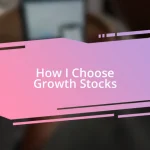Key takeaways:
- Bitcoin is a decentralized digital currency with a capped supply of 21 million, highlighting its scarcity and value.
- Investors face risks such as price volatility, regulatory uncertainties, and security threats, necessitating careful research and strategic planning.
- Future trends in Bitcoin investing include institutional adoption, development of Bitcoin ETFs, and potential regulatory changes that could impact market dynamics.

Understanding Bitcoin Basics
Bitcoin, at its core, is a decentralized digital currency that operates on a technology called blockchain. When I first learned about blockchain, it felt like discovering a magic trick—how could something be secure and transparent at the same time? This mix of innovation and trust really opened my eyes to the possibilities that Bitcoin brings.
One striking aspect of Bitcoin is its limited supply; there will only ever be 21 million Bitcoins. This scarcity made me rethink the concept of value. It’s like knowing there’s only a certain number of classic cars left in the world—doesn’t it create a sense of urgency to get involved?
I remember sitting in a café and overhearing a discussion about mining Bitcoin. People often think it’s just about complicated algorithms, but it’s fascinating how miners dedicate their resources to verify transactions and secure the network. Have you ever thought about what it takes to keep a currency operating? It’s this collaborative effort that truly highlights Bitcoin’s unique community-driven nature.

How Bitcoin Works
Bitcoin transactions occur through a peer-to-peer network, where users send and receive currency directly without needing intermediaries like banks. When I first grasped this concept, it felt revolutionary—like suddenly having the freedom to conduct transactions on my own terms. Each transaction is verified by network participants called miners and recorded on the blockchain, which allows for traceability and security. Isn’t it fascinating how this technology builds trust without requiring a central authority?
The process of validating transactions involves solving complex mathematical problems, something I liken to a digital scavenger hunt. Miners compete to find the solution, and the first to solve it adds the block of transactions to the blockchain, receiving Bitcoin as a reward. I remember feeling a mix of admiration and envy the first time I watched a mining tutorial. It sparked my curiosity about technology and how it ties in with finance. It’s a bit like a high-stakes game of chess, where every move impacts the market.
To help visualize how Bitcoin compares to traditional currencies and banking systems, here’s a simple comparison:
| Aspect | Bitcoin | Traditional Currency |
|---|---|---|
| Decentralization | Yes | No |
| Transaction Verification | Network Consensus | Central Authority |
| Supply Limit | 21 million | Unlimited |
| Ownership | Individual Control | Bank Managed |

Risks of Investing in Bitcoin
Investing in Bitcoin can be thrilling, but it also comes with significant risks. I remember when I first jumped into the cryptocurrency world; the exhilaration was palpable, but it quickly led to moments of panic. Price volatility is one of the biggest challenges. One day, my investment soared, and the next, it plummeted. It really taught me that the market can be unpredictable, and that’s something every potential investor should consider.
Here are some key risks to keep in mind:
- Price Volatility: Bitcoin’s price can fluctuate wildly, leading to potential losses.
- Regulatory Uncertainties: Laws surrounding cryptocurrency vary by country and can change rapidly, impacting the market.
- Security Risks: Hackers have targeted exchanges and wallets, creating risks for investors’ funds.
- Market Manipulation: The market can be influenced by rumors and high-profile endorsements, leading to dramatic price shifts.
- Lack of Consumer Protections: Unlike traditional banking, there are often fewer safeguards in place for crypto transactions, leaving investors vulnerable.
Navigating these risks demands careful research and a clear understanding of one’s financial goals. I wish someone had told me to approach my investment with caution rather than enthusiasm alone.

Strategies for Buying Bitcoin
When I first ventured into buying Bitcoin, I quickly learned that timing can be everything. I remember waiting for a dip in the market, only to watch it surge unexpectedly, leaving me feeling a mix of excitement and regret. Setting price alerts helped me stay informed without constantly checking the charts, but it also taught me the importance of developing a strategy rather than relying solely on luck.
A dollar-cost averaging approach is something I now swear by. This strategy involves consistently investing a fixed amount of money over time, regardless of Bitcoin’s price. It was a game-changer for me. Instead of stressing about the best time to buy, I focused on my long-term goals, which helped ease my anxiety and made my investment feel more manageable. Have you ever felt overwhelmed by market fluctuations? This method could be a practical solution.
Choosing the right exchange is another critical aspect. Early on, I opted for a popular platform but was disappointed by their slow transaction speeds during peak times. After experiencing those delays, I shifted to a more reliable exchange with better security features. Now, I can buy or sell Bitcoin promptly when the opportunity arises. It’s incredible how this choice changed my overall experience in the crypto space, making me feel more secure and empowered.

Securing Your Bitcoin Investments
Securing your Bitcoin investments is a crucial step that I wish I had prioritized from the start. Early in my journey, I quickly learned about the importance of hardware wallets. I remember feeling nervous after reading stories of exchanges getting hacked, so I decided to invest in a hardware wallet to store my Bitcoins safely offline. This simple shift really eased my anxiety and made me feel more in control of my assets.
Another key aspect of security is enabling two-factor authentication on all accounts associated with my Bitcoin transactions. Initially, I viewed it as a hassle—more steps to go through before trading. However, after a friend experienced a security breach, I realized that those extra moments could save a lot of stress and funds. Wouldn’t you feel a lot more secure knowing someone can’t easily access your accounts with just a password?
Lastly, I’ve found that diversifying my storage solutions is essential. While I rely on my hardware wallet, I also keep a small amount in a secure mobile wallet for transactions. This way, I won’t be locked out of my assets in case of unforeseen circumstances. Have you ever thought about how easily one setback could hinder your access to your investments? It’s a balance of convenience and security that I believe is vital for any Bitcoin investor. The peace of mind that comes from keeping my investments secure is absolutely worth it.

Tax Considerations for Bitcoin
When I first started trading Bitcoin, it didn’t take long for me to realize I needed to wrap my head around tax implications. I vividly remember my surprise when I discovered that any gains from Bitcoin transactions are taxable events in most jurisdictions. It was a bit of a wake-up call, as I had assumed my gains were just part of my investment strategy, not realizing the IRS—or any tax authority—was watching. Have you ever thought about how tax liabilities can creep up unexpectedly during a profitable trade?
As I navigated my early transactions, I learned that keeping accurate records was essential for tax purposes. I started maintaining a simple spreadsheet tracking every buy and sell, along with the respective dates, amounts, and transaction fees. It felt tedious at first, but I soon understood the value of this practice during tax season. I mean, who wants to scramble through their transaction history at the last minute? The clarity of having everything organized made filing a lot smoother for me.
Another consideration I often reflect on is the tax treatment of different types of transactions. For instance, I remember swapping Bitcoin for other cryptocurrencies and later realizing those exchanges could also trigger capital gains taxes. That realization led me to rethink every transaction I made, which was quite an adjustment for someone new to the space. Have you considered how various types of trades might affect your tax situation? Understanding these nuances can save you from unexpected tax bills down the line.

Future Trends in Bitcoin Investing
Looking ahead, I see a push toward institutional adoption of Bitcoin that could reshape the investing landscape. I recall the buzz when major companies began adding Bitcoin to their balance sheets; it felt like a turning point. This trend not only legitimizes Bitcoin but also influences prices and creates a more stable demand—wouldn’t you agree that greater acceptance can reassure hesitant investors like we once were?
Another trend I think is worth noting is the development of Bitcoin ETFs (Exchange-Traded Funds). When I first heard about potential ETFs, I was genuinely excited. The idea of being able to invest in Bitcoin without actually holding it could open the floodgates for more traditional investors who find the technical aspects daunting. Have you ever considered how much simpler investing could be if it came with the convenience of familiar trading mechanisms?
Lastly, I can’t help but think about the future of Bitcoin regulation. As governments continue to take an interest in cryptocurrencies, I wonder how regulations will shape the market dynamics. In my experience, a well-regulated environment can actually boost investor confidence, creating a more sustainable ecosystem. It’s a bit of a double-edged sword, though, isn’t it? Striking the right balance could either safeguard the market or stifle its innovative spirit.














